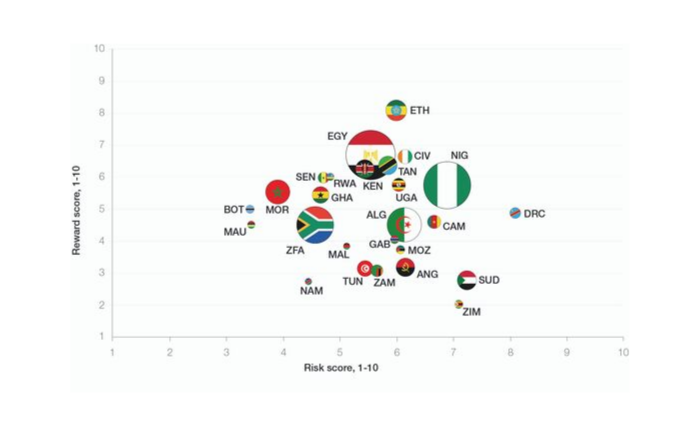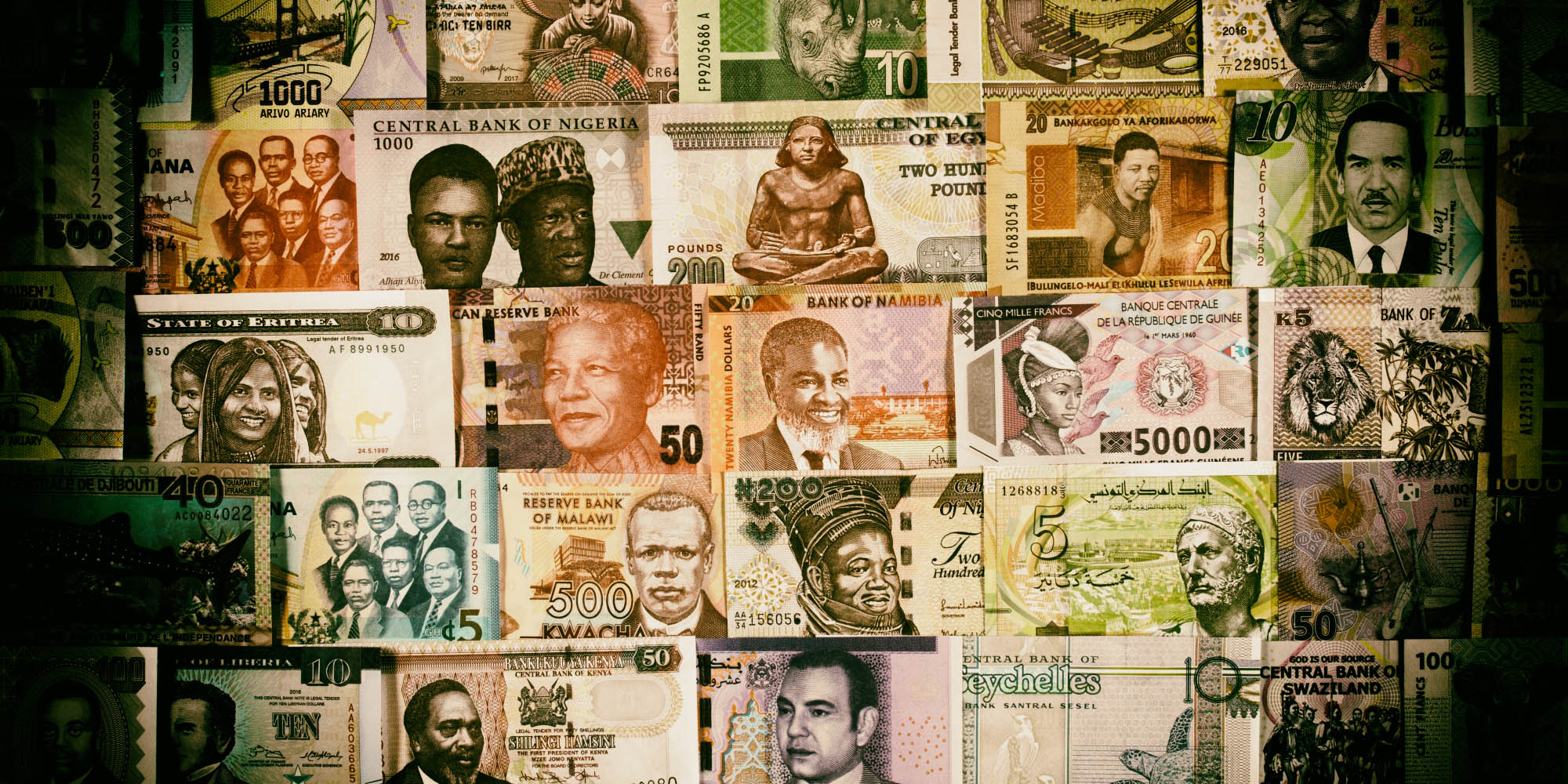Investing in Morocco, Botswana, Ghana, Rwanda, or Senegal could yield better returns at lower risk than investing in South Africa. At the same time, investing in Ethiopia, Egypt, Cameroon, Nigeria, Kenya and Uganda might yield better returns than South Africa, but this comes at greater risk.
This is according to the Africa Risk-Reward index compiled annually by Control Risks and Oxford Economics and released in October 2019.
Africa’s risk-reward index
 Source: Africa Risk-Reward index.
Source: Africa Risk-Reward index.
The index plots each country’s performance relative to African peers and provides old and new investors with a view of market opportunities and risks across the continent.
What is notable is while the economies of South Africa, Egypt and Nigeria dominate, smaller economies such as those of Senegal and Tanzania are attractive when measured on a risk-reward basis.
More importantly, most African countries are improving their position in the index, even if it’s from a low base. While Sudan and Zimbabwe come to mind, they score so poorly as to be almost discounted.
Growing competition for investment across the continent is helping to promote reform, which in turn encourages greater investment. But it’s never a smooth ride as countries previously seen as models of stability and sensible governance — such as Ghana and Zambia — have seen their standing decline relative to their peers. At the same time others — such as Namibia — have an improving outlook despite economic headwinds.
Most African governments have recognised that diversification is essential and that their economies cannot rely simply on mineral wealth.
Says François Conradie, head of Africa Research at Oxford Economics:
“Especially at a time of trade war, which threatens to further depress Chinese demand for commodities and global demand for oil and gas, dependence on raw commodities exports is a serious weakness for an economy. It is for this reason that governments are competing to attract investment — both of capital and firms — to grow their manufacturing and services sectors.”
The trade war is not the only macro-economic trend impacting on African economies. Shifting geopolitical influences are playing out and these will affect business conditions and growth at the country level.
Once a proxy battlefield for the US and Russians during the Cold War, Africa has become a battlefield for US and Chinese interests. But these economic giants have not fared as evenly as some think. Current US-Africa trade totals $39-billion, while China-Africa trade represents more than $200-billion, according to the research.
But China is not alone. EU-Africa trade is now at more than $300-billion, while the researchers also noted a surge of interest from smaller geopolitical players such as Russia, the Gulf states, Turkey and India. Nowhere is this clearer than in Sudan.
“The standard narrative of US-China rivalry in Africa had always looked like an over-simplification, but is outdated,” says Barnaby Fletcher, senior analyst at Control Risks.
“China’s engagement with Africa is undergoing a fundamental shift, the US is playing catch-up and a host of other countries are seeking to expand their influence in an increasingly multipolar landscape.”
Geopolitical objectives are being supported by a flood of development finance, creating both opportunity and competition for private-sector players — and challenges for governments because it can crowd out private-sector investment.
African governments will have to manage these competing interests at the same time as they are focused on opportunities unlocked by intercontinental trade. The signing in late May of the African Continental Free Trade Area (AfCFTA) is a massive milestone even if its implementation is likely to be slow and tortuous.
What is notable is the progress that regional trading blocs, which will become the cornerstones of AfCFTA, are making in reducing trade barriers.
The East African Community (EAC), which does not contain any of the continent’s economic giants, stands out as this region registers the highest levels of economic growth on the continent.
In recent years the EAC’s Common Market has seen a modest increase in regional trade between the six-member states — Kenya, Uganda, Tanzania, Rwanda, Burundi and South Sudan — by gradually easing restrictions on the movement of goods and people across borders.
The Democratic Republic of the Congo (DRC) has applied to join the bloc, which could benefit Uganda and Rwanda, given their proximity.
However, optimism for the prospects of any trading bloc must be tempered with realism.
Reducing tariffs will not automatically make the DRC, for instance, easy to do business with. And countries are at times competitors rather than friendly collaborators, often driven by politics and personal disputes disconnected from trade.
For example, the main border crossing between Rwanda and Uganda has been closed since February as the two countries accuse each other of spying on or destabilising the other’s regime. Similarly, relations between Rwanda and Burundi have been frozen since 2015 over security issues.
Elsewhere, protectionist concerns play a bigger role. Tanzania frequently blocks goods from other EAC states to protect its domestic industries.
The key message for African economies and investors is that reducing trade barriers promotes healthy competition and an improvement in business environments.
The final trend highlighted by the researchers is, turning decrepit economies around is no easy matter when institutions, state capacity and skills are lacking. It is even more difficult when factoring in counter-reform efforts.
In South Africa, Angola and Ethiopia, reform agendas have slowed as leaders have battled through a web of influential stakeholders with competing interests.
Angolan president João Lourenço has introduced a number of fiscal, monetary and regulatory reforms since 2017 which have been accompanied by other structural changes. These have challenged vested interests, but have introduced a degree of oversight to economic governance.
However, foreign-exchange shortages persist, the economy remains reliant on oil and 2019 is likely to be the fourth consecutive year of recession.
So, despite improvements, Angola’s risk score remains higher and its reward score quite a bit lower than continental averages.
For investors, it becomes clear that those who take time to understand the political and commercial dynamics — and their overlaps — will have better insight into which reforms will succeed, which will stagnate, and which countries present the most attractive investment opportunities. BM





